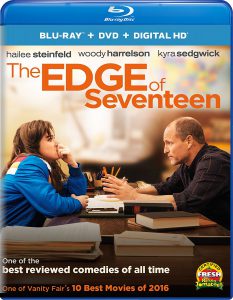“The Edge of Seventeen” is the latest entry in the “teenage girls who are so obsessed with their dream of a perfect life that they make reality out to be worse than it really is” genre. Writer-director Kelly Fremon Craig previously tapped into this vein as the writer of 2009’s “Post Grad,” which starred “Gilmore Girls’ ” Alexis Bledel and worked as a cute little rom-com.
“Edge of Seventeen” isn’t a drastically better script than “Post Grad,” but it’s connecting with a lot more people (tons of positive buzz, and an 8.0 IMDB rating compared to “Post Grad’s” 5.3). I think the reason is almost entirely Hailee Steinfeld, who has previously stolen the show in “Pitch Perfect 2,” “Ender’s Game” and “Barely Lethal,” to name a few.
At one point, Steinfeld’s Nadine describes friend Erwin (impressive newcomer Hayden Szeto) as being an old soul, but Steinfeld, 19, herself embodies that quality. This leads to a dichotomy that may not be realistic, but it is immensely watchable: In the script, Nadine is not a particularly good person, but in Steinfeld’s performance and Craig’s direction, she sometimes is sympathetic. This can come from a universal truism such as being unable to strike up a conversation with anyone at a party, or from a rare happy expression on Steinfeld’s face.
What makes “The Edge of Seventeen” different from the films it’s being compared to (“Juno,” “Easy A,” “Mean Girls,” and so forth) is that the main character is aggressively self-centered. The film has supporting players we’d like to know more about, but because the narrative is delivered through Nadine’s eyes, learning specifics about the people in her life is like trying to open a door with a door stop in the way.
I’m confident that Craig intends for “Seventeen” to play this way; it’s an artistic way of commenting on the fact that teenagers tend to be selfish. But for a film with a simple statement, it’s more engrossing than you’d think. While Steinfeld is a big reason for this, I did find myself craving more complete knowledge about best bud Krista (Haley Lu Richardson), brother Darian (Blake Jenner), mom Mona (Kyra Sedgwick) and teacher Mr. Bruner (Woody Harrelson) than what we get from Nadine’s skewed perspective.
For me, “Seventeen” calls to mind 2002’s “The Good Girl,” with Nadine as the parallel to Jake Gyllenhaal’s Holden. While “The Good Girl” was a dark comedy that poked fun at the cliché of the depressed, internally mired teen, “Seventeen” treads more in the real world. It might be classified as a comedy, but it hardly spews out jokes and one-liners. Still, Craig’s script does seem to be aware of its clichéd nature. Mr. Bruner’s eye-rolling reactions to Nadine’s tales of woe make him the audience surrogate; since he puts up with Nadine, we’re given permission to do the same.
SPOILERS FOLLOW.
Ultimately, it’s to “Seventeen’s” credit that it’s an internal drama rather than a melodrama. After Nadine has the standard teen-romance realization that the cute guy she has a crush on (Alexander Calvert’s Nick) entirely lacks a personality, she wakes up the next day and decides to be nice to everyone. She attends Erwin’s film festival screening, she bids a pleasant day to her brother and former bestie (giving us hope that they can reconnect), and she returns her mom’s text rather than making her worry. Nadine outgrows her “woe is me” phase overnight, realizing that by choosing to not hate everyone’s guts, life is easier.

One thing that prevents “Seventeen” from being a classic is that it doesn’t feel particularly grand. Yes, Nadine opens up by the end of the film, and that’s satisfying to see. But we never get a solid sense of who she is, other than being unaccountably self-loathing and critical of everyone. She’s sometimes socially awkward – she looks into the bathroom mirror at the party and tells herself to stop being so awkward – but on the other hand, she has no internal roadblocks. She effortlessly sets up dates with Erwin and Nick. She joyrides in her mom’s car without any paranoia about potential consequences.
Erwin likes making animated films, but what does Nadine like? At one point, she tells Mr. Bruner that he made a mistake during his Civil War lecture, and he tells her – such is the nature of their riffing — to get a life. The odd thing about Nadine is that she does have a full “life” in the teenager sense – she’s obsessed with boys, parties, having friends and being liked – but she doesn’t have interests beyond that (her Civil War interest is embodied only in that one line). Ironically, one of her lunch-hour rants to Bruner is about how other kids her age don’t have lives beyond shallow interests.
My biggest disappointment, though, is that “Seventeen” whiffs by not having a reconciliation scene between Nadine and Krista. Starting with a cute scene where the girls bond over a pet caterpillar as 7-year-olds, that practically life-saving friendship (Nadine’s first and only friendship outside of her bond with her dad) plays behind every scene in a way Craig doesn’t seem to realize. (Even more curious, the film’s working title was “Besties.”)
The somewhat inconsistent portrayal of Nadine and the film’s shaky grasp on threads other than Nadine’s journey to self-realization perhaps makes “Seventeen” unworthy of joining the coming-of-age canon. Thanks to Steinfeld, though, it’s certainly engaging from start to finish.

